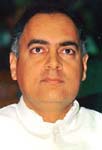The Rediff Special/B M Oza
The PMO systematically and deliberately bypassed the embassy and dealt directly with the Swedish authorities
 The mafias in Rajiv Gandhi's PMO were not as uncivilised as the likes of R K Dhawan, a stenographer-turned-politician, even a former minister. But the style was basically the same. Bluff and bluster. For example, immediately after the release of the Swedish Audit Board Report in early June 1987, I told Ronen Sen in one of our many telephonic exchanges that we should suspend the contract and sue Bofors for fraud and that I would call the Bofors management and give a dressing down for giving us false and misleading information in their report to me. He advised me not to do any such thing and warned that it may amount to breach of parliamentary privilege as a parliamentary committee was in the making to look into the matter. The parliamentary committee remained in the making for three months after that. I asked Ronen to send his instructions in writing. He never did. I sent my recommendations in writing. I never received any reply to them.
The mafias in Rajiv Gandhi's PMO were not as uncivilised as the likes of R K Dhawan, a stenographer-turned-politician, even a former minister. But the style was basically the same. Bluff and bluster. For example, immediately after the release of the Swedish Audit Board Report in early June 1987, I told Ronen Sen in one of our many telephonic exchanges that we should suspend the contract and sue Bofors for fraud and that I would call the Bofors management and give a dressing down for giving us false and misleading information in their report to me. He advised me not to do any such thing and warned that it may amount to breach of parliamentary privilege as a parliamentary committee was in the making to look into the matter. The parliamentary committee remained in the making for three months after that. I asked Ronen to send his instructions in writing. He never did. I sent my recommendations in writing. I never received any reply to them.
Similarly, I asked him to put down all his queries about my contact with Lars Ringberg in writing. He did not. Lars Eric Thunholm, chairman of the Nobel Group said in a public statement that Bofors paid commissions to its agents: if they were passed on as bribes to anybody in India, Bofors was not responsible. I was asked by the media to react. I reacted by saying that it was a highly irresponsible statement, as Bofors had given an undertaking not to have any middlemen in this contract and they were responsible to ensure that no commissions were paid to middlemen and that there were no bribes in this business.
The next day, Bofors apologised for Thunholm's statement. Ronen Sen rang up to admonish me. He emphatically asked me not to make any statements on Bofors in the future. I asked him to put down his instructions in writing. He did not.
Similarly, several instructions were given to me about calling Bofors representatives for JPC hearings and conditions governing these hearings. All this was done on the telephone. I insisted to have them in writing. It never happened. I repeatedly asked if the PMO was to function as the secretariat or channel of communication with the JPC. I never got any clarification. Yet orders and instructions kept coming from the PMO on behalf of the JPC. This culture of bluff and bluster should be remedied. The PMO should be made as much accountable for its conduct as other ministries and departments of the Government of India are.
The third important irregularity committed by the PMO was to systematically and deliberately bypass the embassy channel and deal directly with the Swedish authorities. This was highly undesirable. It undermined the importance of the traditional channels of diplomacy and lowered the prestige of the embassy in the eyes of the Swedish officials. The most guilty in the long line of officials was the top man, Rajiv Gandhi himself.
His telephone call to Ingvar Carlsson ostensibly to thank him (for what, one does not know) tied him in knots and caused a lot of confusion and embarrassment to the embassy and to me personally as already indicated in the previous pages. Minister of state Natwar Singh appeared to be in the habit of calling Sten Anderson, the Swedish foreign minister, for only he knew what. Other officials habitually called officials in the Swedish prime minister's office and transacted business on telephone. 'Hi Hans, Hi Chinmay' or 'Hi Ronen' were common greetings in exchange of telephone calls to transact business directly.
One did not mind that the officials were on first name terms. But by passing the embassy channel in dealing with a foreign government was a serious lapse. One can understand that in an emergency one had to resort to the instrument of a quick telephone call. But as a habitual way of transacting business it was not correct. Even when such calls were made in exceptional circumstances, a note recording the gist of conversation should always be prepared and placed on the file. This was never done.
These are the days of summit diplomacy. Heads of state/government consider it important to remain in personal touch with one another on important international or bilateral issues. But such calls should be few and about really important and urgent matters. They should not be just to say thank you for nothing.
 Even the JPC has been guilty of bypassing the embassy channels. It could be argued that the JPC was not part of the Indian government machinery and therefore not obliged to use the embassy channels. But the selective use of the embassy channel was not in order. It used the embassy channel -- of course, through the PMO -- to call Bofors officials for its hearings in September 1987. But it did not use the embassy, nor did it even inform the embassy when it sent a CBI team to meet with Swedish government officials, viz the state secretary for foreign trade, director of the Swedish Central Bank and the war material inspector.
Even the JPC has been guilty of bypassing the embassy channels. It could be argued that the JPC was not part of the Indian government machinery and therefore not obliged to use the embassy channels. But the selective use of the embassy channel was not in order. It used the embassy channel -- of course, through the PMO -- to call Bofors officials for its hearings in September 1987. But it did not use the embassy, nor did it even inform the embassy when it sent a CBI team to meet with Swedish government officials, viz the state secretary for foreign trade, director of the Swedish Central Bank and the war material inspector.
After all, they used the Indian government organ for this purpose, viz the CBI. It had to deal with Swedish government officials and not Swedish parliamentary organs. So what harm was there in informing and associating the Indian embassy in this exercise? The only explanation could be that they had no confidence in the head of the Indian mission in Stockholm, viz the Indian ambassador. The Indian ambassador did not suffer in the process. But the credibility of the JPC suffered.
Finally, corruption in politics and public life has spread to alarming proportions. It should be an urgent task to address how to deal with the monster of corruption. Clearly, parliamentary probe is not an answer as the JPC probe in the Bofors business has demonstrated. A parliamentary probe cannot be a substitute for an investigation by a professional criminal investigating agency.
Extracted with permission from Bofors, The Ambassador's Evidence by B M Oza, published by Konark Publishers Pvt Ltd, 1997, Rs 250. Readers interested in buying a copy of the book may write to Konark Publishers Pvt Ltd, A-149, Main Vikas Marg, Delhi 110092
Tell us what you think of this extract
|



